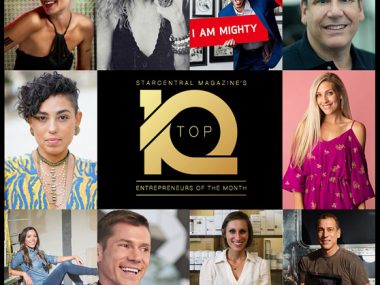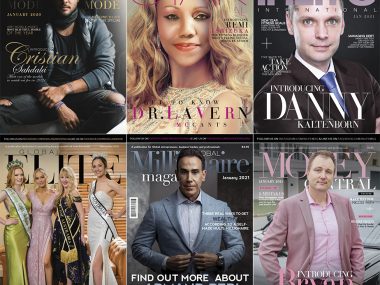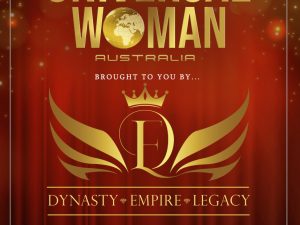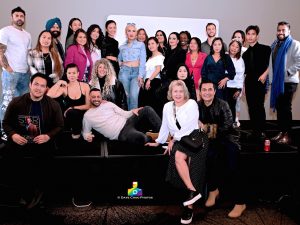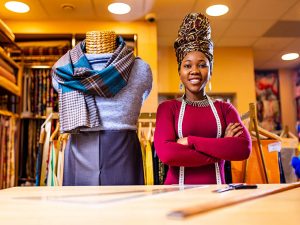As announced exclusively by Variety earlier this year, GeekWire Chairman and tech veteran Jonathan Sposato has officially launched his multimedia platform JoySauce Network, which has already featured iconic pillars of the AAPI community in their content, including George Takei, and many other disruptors, innovators, and game changers. Most recently, Jonathan and his team released the first episode of their late-night variety series “JoySauce Late Night,” which can be viewed here (JoySauce Late Night Ep 1).
Inspired to do better and create a platform for the AAPI community after the lack of representation on screen and in the entertainment industry growing up, Jonathan’s JoySauce multimedia platform has been a long time coming with “JoySauce Late Night” as his major platform launch with his late night variety show unlike any other highlighting the Asian-American experience, promoting up and coming talent in the industry and truly shining a light on the AAPI community, their untold stories and much more. Some talent tied to the first season as guests include David Henry Hwang (Showtime’s “The Affair”), Miranda Kwok (ABC’s “The Cleaning Lady”), and Ed Lu (NASA Astronaut), to name a few.
A serial entrepreneur, Sposato is the Chairman of GeekWire.com, Chairman and Founder of PicMonkey (the world’s most popular web photo editor), and WeCount.org, a non-profit using consumer internet technologies to aid the homeless. Along with countless other investments and startups, Jonathan also founded Phatbits, which went on to become Google Gadgets. Prior to Phatbits, Jonathan was a Senior Manager in Microsoft’s consumer division, personally delivering the next level of thought on key Microsoft properties to chairman Bill Gates and the company’s leadership, as well as driving the development of award-winning software applications, Xbox video games and social communications applications.
StarCentral Magazine recently caught up with Jonathan to discuss his journey in the industry, and here’s what went down:
When did your entrepreneurial flair first reveal itself?
If I am being perfectly honest, it was probably when I was 13 or 14 and wrote my first computer game on the Apple II+ that I understood the rewards (and risks) of entrepreneurship. It was a wonderful realization that one could create something from scratch and have it impact the lives of many people. I won’t lie that not having a boss while working on exactly what you want also had a profound impact on how I thought about entrepreneurship.
What did your life look like before beginning your media platform?
Before JoySauce.com, I had already created several other things that I was lucky enough to have scale to large audiences, but none of them were as much a ‘passion’ pursuit as this. I often struggled to find ways that my businesses would be much more mission aligned with doing some social good in the world. Even before AANHPI hate crimes sadly proliferated, the need to raise the visibility of AANHPI’s in mainstream media was a huge passion for me. AANHPI’s are more than 7% of the U.S. population and in some major cities nearly 20%, yet less than 3% of all speaking roles in movies & TV are AANHPI. I felt strongly that I wanted to help change that Small or big, doing something meant that I could change it in a “non-zero” way!
As an entrepreneur, what is it that motivates and drives you?
First off, my biggest motivation is in driving change, where meaningful change is a function of being first, big, special, or unique. There has got to be a good reason why people take notice of you. You’ve got to deliver value out into the world that hopefully inspires and influences how a conversation moves forward. So yeah, my biggest motivator as an entrepreneur is driving change, and in this case, creating a world in JoySauce were AANHPI representation is always powerful, strong, beautiful, inspiring, and positive.
In one word, describe your life as an entrepreneur and explain why.
In one word!? That’s a tall order… let’s see… “lucky.”
What were your top three motivations for starting your media platform?
My top three motivations for starting JoySauce were;
- AANHPI’s are more than 7% of the overall U.S. population and yet less than 3% of all speaking roles in movies and TV.
- Of that 3%, much of the representation while well intended, paints a much narrower and, at times tropish picture of what the AANHPI experience is like. As an “American Asian” who grew up in the U.S., I felt a gap in showcasing the much more nuanced, complex, and misunderstood experiences of those of us who balance fitting in, while maintaining and honoring our heritage. So I wanted to give voice to that segment.
- I wanted to be first in a few things. I wanted to showcase the first professional AANHPI pro race car driver in our reality TV series “Team Tan.” I wanted to showcase the first unscripted interview series on AANHPI mixed-race couples. I wanted to launch the first ALL-American-Asian late-night talk show.
What do you put your success down to?
Certainly, luck is a big component and I never forget that. Sometimes it’s simply being at the right place at the right time. But there’s an element of increasing your “good luck surface area” whereby you put in place elements that can create more good luck. Sometimes it’s deliberately creating a brand that is fun, delightful, and noticeably differentiated from what’s come before it. Sometimes it’s taking chances on bold ideas that others might not be bold enough to tackle. Often it’s being inclusive of marginalized voices (both on-camera and end audience). JoySauce’s decisive and clear inclusion of LGBTQ+ AANHPI voices, not as a standalone thing but a wholly and naturally integrated part of JoySauce, is something we’re proud of and is resonating with audiences of all kinds.
What would you say are the key elements for starting and running a successful business?
I have to give former Google CEO Eric Schmidt credit for saying this in a meeting, but I agree that greater than 75% of creating a successful business is getting that core ‘insight’ correct. What key insight do you have about audience or user expectations or a problem that needs to be solved, are you offering the world? In JoySauce’s case, it is 100%; “OMG, there is NOT a cool, edgy, unapologetic cross-media platform with a strong POV speaking to people like me.”
What are the three biggest challenges you have faced growing the business and how did you overcome them?
When it comes to JoySauce in particular, the challenges do differentiate from my other ventures in some key ways. One is how fraught the AANHPI space can be at times. What I mean is that we’re still in the first few stages of understanding ourselves, who can speak, who should speak less, what words we want to use, how we should partner, etc… It’s like the whole segment is trying to figure it out, and sometimes there’s a little more ‘defensive driving’ than necessary as everyone is trying to figure it out. Hopefully, very soon, we move to the next stage where participants in the segment understand that this is a very large pond, the opportunity HUGE, and that we’re actually all better together. It is also my hope, not just with JoySauce but for the good of the whole, that the way many folks dialogue on social media, criticize, tear each other down, and gatekeep… starts to dissolve and ease up over time. It’s gotten out of hand. Instead of calling out, let’s do more ‘calling in,’ yeah?
Can you tell us more about your “JoySauce Late Night” series? What do you hope viewers will take away from it?
Yes! JoySauce Late Night is the very first ALL-American Asian late-night talk show, featuring an AANHPI host, co-host, guests, cast members, musical artists, writers, camera operators, production folks, etc. It features some hilarious writing, and delightful surprises, all centered on a different AANHPI luminary (David Henry Hwang, Miranda Kwok, Ed Lu, Michelle Li, Nancy Yoon, etc.) and the conversations get REAL. It’s not just a quick 2 or 3-minute segment typical of current late-night, but a longer format where we go into not just people’s careers but how complexities around their Asian identity has impacted them. Thru our skits and musical numbers we clearly underscore the incredible talent and diversity within our American Asian community. We can truly do anything and have a seat at any table. We picked the late-night talk show format on purpose as it is the most canonically “American” of all TV shows. What if we can normalize the world to seeing an ALL Asian late-night talk show? Wouldn’t that move the needle far in terms of acceptance in mainstream media? I very much think so.
What do you hope to see happen in the near future for small businesses all over the world?
That more folks realize that they need not fear failure. In Samurai folklore, there’s a credo along the lines of, “Don’t fear dying. Fear not living.” And that is how I see entrepreneurship and starting small businesses. Small businesses are the backbone of this country. Without small businesses, we would not have the kind of innovation in our society that we have historically enjoyed, and we need to continue lowering barriers for new entrants. As reported in Forbes magazine, the U.S. Small Business Association (SBA) cited that small businesses of 500 employees or fewer make up 99.9% of all U.S. businesses and 99.7% of firms with paid employees. Of the new jobs created between 1995 and 2020, small businesses accounted for 62%—12.7 million compared to 7.9 million by large enterprises. Further, a 2019 SBA report found that small businesses accounted for 44% of U.S. economic activity. Without small businesses, the American economy and workforce would not be nearly as vibrant, ripe with innovation, or valuable! So let’s make more, and in the meantime, please enjoy JoySauce.com!







